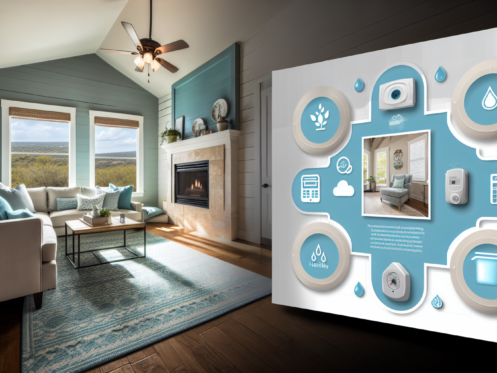Learn how to reduce humidity in house with Quality Cooling & Heating. Find practical tips to lower moisture, prevent mold, and improve your home’s comfort.
Keeping your home comfortable is important for your health. One common issue many homeowners face is high humidity levels. Too much moisture can cause mold, dust mites, and make your home uncomfortable. Luckily, there are many ways to lower humidity in your home. Here are some tips to make your home more comfortable.
Understanding the Importance of Humidity Control
Before we look at solutions, it’s important to know why controlling humidity matters:
- Health Benefits: Lowering humidity can cut the risk of mold and mildew, which can cause breathing problems and allergies.
- Comfort: Good humidity levels make your home feel cooler in summer and warmer in winter.
- Preservation: Controlling humidity protects your home and your things from damage caused by too much moisture.
Effective Tips to Reduce Humidity in Your House
Here are some practical steps you can take to lower humidity levels in your home:
- Use a Dehumidifier: Dehumidifiers remove extra moisture from the air, making them great for controlling humidity. Put them in areas with high humidity, like basements and bathrooms. Learn more about dehumidifiers.
- Ventilate Properly: Make sure your home is well-ventilated. Use exhaust fans in bathrooms and kitchens to get rid of moisture from cooking and showering. Open windows on dry days to improve air flow.
- Fix Leaks: Look for leaks in your plumbing or roof. Even small leaks can add a lot to indoor humidity. Fixing these leaks quickly can stop moisture buildup.
- Use Air Conditioning: Air conditioners cool your home and help reduce humidity. Keep your AC unit well-maintained to make sure it works efficiently. Find out about air conditioner repair and maintenance.
- Avoid Drying Clothes Indoors: Drying clothes indoors can add a lot of moisture to the air. When you can, dry clothes outside or use a dryer that vents outside.
- Houseplants: While houseplants can improve air quality, some plants release moisture. Think about having fewer plants or choosing ones that don’t add moisture.
- Use Moisture-Absorbing Products: Products like silica gel, activated charcoal, and moisture-absorbing crystals can help lower humidity in small spaces.
By following these tips, you can manage and lower humidity in your home, making it more comfortable and healthy. For more advanced solutions and professional help, think about contacting Quality Cooling and Heating. Our team is here to help you get the perfect indoor climate.


